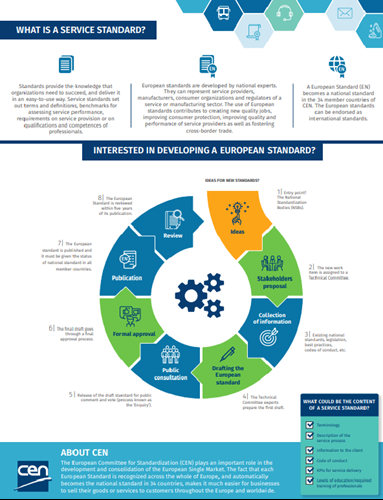Services represent more than 70% of economic activity in the European Union, making the development of a Single Market for services a top European priority.
In this context, standardization plays a crucial role by supporting market integration, enhancing cross-border trade, and contributing to higher levels of safety, performance, and consumer and environmental protection.
European service standards help establish common benchmarks for quality and performance. These standards enable businesses to assess their own services or those they procure, leading to greater transparency, competitiveness, and efficiency.
In addition, service standards foster better communication and trust between suppliers and customers. They help clarify customer expectations and support suppliers in delivering appropriate, high-quality services. Increasingly, standards also address professional qualifications, including minimum competence requirements for service providers.




